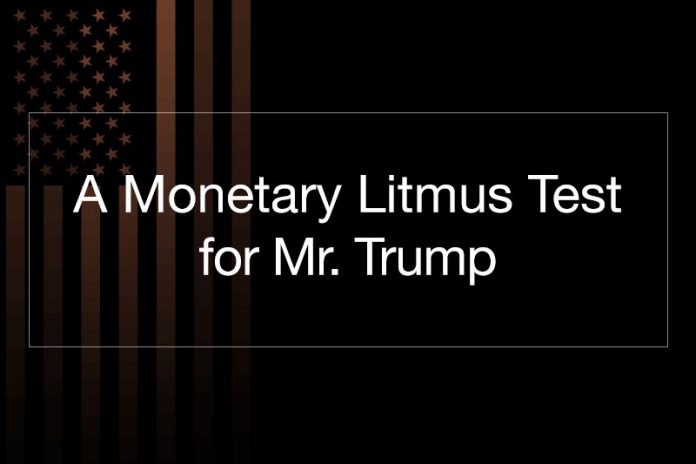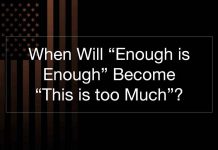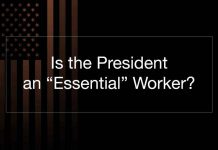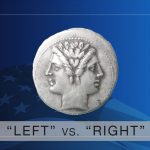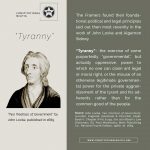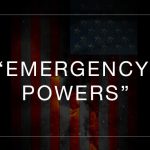Last Updated on October 2, 2021 by Constitutional Militia
Recently, various analysts and commentators in the alternative media have darkly speculated that, rather than presenting a real opportunity to “make America great again”, Donald Trump’s ascendency to the Oval Office actually provides the Globalist International with the perfect opportunity to take a giant stride in the direction of a “new world order” in which America will be reduced to a mere satrapy in a grandiose scheme of totalitarian “global governance”. Their negative appreciations of the situation and prognostications generally follow these lines:
(i) The world is now confronted by an ever-intensifying economic crisis which is insoluble within and through the present international arrangements of fiat currencies, fractional-reserve central banking and allied financial dealings, politically orchestrated “free trade”, and so on.
(ii) When this crisis finally explodes in a worldwide catastrophe—whether in the form of an economic contraction in comparison to which the Great Depression of the 1930s will appear as a period of prosperity, of the hyperinflation of major currencies such as the Federal Reserve Note which will dwarf the Weimar inflation of 1923, or of one followed by the other— entirely new arrangements will have to be made.
(iii) The onset of such a catastrophe could be the result of chance. Or it could be brought about by the Globalist International, which now controls all of the world’s major financial institutions through the engineered collapse of which the cataclysm could be triggered at almost any time.
(iv) In either event, although in fairness Mr. Trump cannot possibly be blamed for any of the circumstances which are leading up to and will cause the catastrophe—for which, self-evidently, the Globalist International should be condemned as fully responsible, its political puppets having been in power throughout most of the Western world since the end of World War II—the Trump Administration will be held at fault. Not only that, but the surge of national populism which elected Mr. Trump will be discredited. And the mass of Americans who supported him will be left disconsolate, depressed, and politically disarmed in the face of the Globalists’ taunt that “we told you so”— leading to the ascendancy of the Globalist International’s candidates in the next Congressional and Presidential elections; and then to the enactment of legislation, ratification of treaties, and signing of “executive orders” and other decrees necessary and sufficient to secure the final victory of globalism over Americanism.
(v) Some analysts and commentators even go so far as to impugn Mr. Trump as actually nothing less than a “Manchurian Candidate” deviously put up by the Globalist International in order to preside over the catastrophe as its own front-man. Others argue that, although the Globalist International was truly surprised by Mr. Trump’s election, it immediately realized that it could turn his Presidency to its own advantage by accelerating the arrival of the inevitable catastrophe during the next few years, and will set about to do so soon after Mr. Trump is inaugurated. The latter scenario, of course, depends upon the accuracy of the Globalist International’s apparent assessment that, being only an amateur in the fields of Ponzi economics and criminal politics, Mr. Trump will prove unable to foresee, let alone to thwart, the Globalist International’s machinations.
To be sure, if Mr. Trump is a “Manchurian Candidate” after all, that is the end of the matter. America is likely doomed, unless “the Deplorables” realize— and take decisive action based on their realization—that (in the words of the Declaration of Independence) “a long train of abuses and usurpations, pursuing invariably the same Object [has finally] evince[d] a design to reduce them under absolute Despotism”; and therefore “it is their right, it is their duty, to throw off such Government, and to provide new Guards for their future security”. At that juncture “in the Course of human events”, though, all bets will be off. For no one can predict whether “the good People” of America will prove able to secure for themselves, “among the powers of the earth, the separate and equal station to which the Laws of Nature and of Nature’s God entitle them”, but which the Globalist International is intent upon wrenching from them.
Without far more evidence than anyone has adduced to date, I am unwilling to entertain the “Manchurian Candidate” thesis, or to conclude that a “Declaration of Independence situation” now confronts this country with the desperate choice to do or to die. Yet I am no less disinclined simply to abide events, merely hoping for the best. The political-scientific method is to apply a litmus test to determine what Mr. Trump’s political pH actually is with respect to the economic crisis. Such a test is mandatory, because this is THE problem which his Administration must solve, or go under, taking the United States with it.
In every major country throughout the world, the main source of the Globalist International’s power has been, and remains, its stranglehold over money and banking—embodied, in the United States, in the Federal Reserve System. The present economic crisis has arisen, not only because (as sound economic theory teaches and repeated experience has confirmed) the Federal Reserve System—indeed, all central banks—are unworkable in principle, but also because in practice the Globalist International has systematically employed that System—indeed, all central banks under its thumb—to loot most of the people of every country in which such banks have operated, for the benefit of minuscule minorities of those country’s populations, and will continue to do so until some irresistible force puts an end to its depredations. Moreover, perforce of the Federal Reserve System’s monopolistic position and claimed “independence” from political supervision let alone control, the Globalist International has been, and remains, able to threaten every American President and Congress with the specter of financial and then general economic chaos and attendant social upheavals should the government fail to satisfy the bankers’ incessant and insatiable demands for all sorts of abusive special privileges—from the prohibition of “gold-clause contracts” and the seizure of private citizens’ gold during the Roosevelt Administration, to the repeal of the Glass-Steagall Act’s safeguards during the Clinton Administration, to the first big ($700 billion) “bail out” of financial institutions supposedly “too big to fail” during the Bush Administration, to the “too big to jail” policy which effectively immunized those institutions during Mr. Obama’s residence in the White House, to whatever the bankers’ menaces can pry out of the Trump Administration in the future. Therefore, in order to deal with the economic crisis—and to disarm the Globalist International of its most potent weapon—the Trump Administration must bring the Federal Reserve System to heel, immediately if not sooner. Whether Mr. Trump can muster the foresight, the insight, the prudence, and the courage to do so will be his critical litmus test. The question, then, is “What should he do?”
A. Some people imagine that President Trump can improve the performance of the Federal Reserve System by appointing new members to the System’s Board of Governors. Inasmuch as the theory of central banking under which the Federal Reserve System operates is hopelessly flawed, this suggestion is no less ridiculous then the expectation that a new set of chemists could improve the performance of a laboratory even though they were still required to conduct their experiments according to the erroneous precepts of the Phlogiston Theory.
B. Numerous voices have called for an “audit” of the Federal Reserve System. What the speakers have in mind would not be an “audit” in the commonplace sense of that term, looking to ferret out run-of-the-mill institutional waste, fraud, and abuse—such as whether the Board of Governors and the Federal Open Market Committee have spent inordinate amounts on plush oriental carpets for their offices, or on lush lunches catered by posh French restaurants in the District of Columbia. Rather, the purpose would be to examine why those bodies have settled on certain “monetary policies” rather than others, and what the consequences of those policies have been— apparently with the “auditors’” goal being to establish that the Federal Reserve System has been incompetent, ineffective, counterproductive, or in some other way deficient as an instrument of “monetary governance”. That such an “audit” would serve that end is, however, a naïve hope.
First, the necessity for such an “audit” is not apparent. “The Chairman of the Board [of Governors already] shall appear before the Congress at semi- annual hearings”, at which “[t]he Board shall * * * submit a written report * * * , containing a discussion of the conduct of monetary policy and economic developments and prospects for the future, taking into account past and prospective developments in employment, unemployment, production, investment, real income, productivity, exchange rates, international trade and payments, and prices”. 12 U.S.C. § 225b(a) and (b). In addition, the Board is already required to “place on its home internet website * * * a repository of information made available to the public for * * * not less than 6 months following the date of release of the relevant information”, including various reports, annual financial statements, and “such other information as the Board reasonably believes is necessary or helpful to the public in understanding the accounting, financial reporting, and internal controls of the Board and the Federal reserve banks”. 12 U.S.C. § 225b(c). Do these requirements not amount, in their own ways, to a rather extensive on-going “audit”?
Second, even an arguably more comprehensive “audit” of the Federal Reserve System would prove next to nothing, in light of the broad statutory language with which Congress has seen fit to license the Board and the Open Market Committee to “maintain long run growth of the monetary and credit aggregates commensurate with the economy’s long run potential to increase production, so as to maintain effectively the goals of maximum employment, stable prices, and moderate long-term interest rates”. 12 U.S.C. § 225a. One need not be overly cynical to conclude that a mandate of this verbal elasticity could and would be stretched so as to rationalize any and every “monetary policy” which the Board and the Committee might have imagined to be advisable under the ever-changing economic situations to which they have been required to respond. What “smoking gun” of gross impropriety, then, could an “audit” of how the Board and the Committee have implemented this statute be expected to disclose? For each and every decision of “monetary policy” there might be (likely would be) a dozen or more ostensibly plausible reasons “pro” and an equal number “con”, as well as equal numbers of entirely different conclusions which the Board and the Committee could have justified with seemingly valid arguments. Thus, such an “audit” would simply provoke endless disputations over the efficacy or inefficacy of this or that policy—all of the debate larded to the gagging-point with the sort of Keynesian claptrap, complex econometric obfuscations, and bureaucratic gobbledygook extolling the Board’s and the Committee’s “expertise” which would leave the general public thoroughly befuddled. Certainly less expensive, and probably no less useful, than such an “audit” would be to conduct an on-going seance aimed at “channeling” the opinions of former officials of the Federal Reserve System who have passed on to the afterlife— for their spirits at least could inform the public as to how they have been rewarded, or (more likely) punished, for their implementations of the central bank’s “monetary policies” during their earthly incarnations. Perhaps the rumored success Hillary Clinton has claimed in “channeling” Eleanor Roosevelt would qualify her as the medium best suited to deliver these messages.
C. Not a few individuals want to dispense with an “audit” and instead simply “abolish the Fed”. To be sure, “abolish[ing] the Fed” in some manner will ultimately be necessary at some point on the road towards eventually imposing sound economic as well as thoroughly constitutional principles on “monetary policy” in both the District of Columbia and the several States. But the slogan “Abolish the Fed!”, with its implications of totality and immediacy, cannot be taken seriously.
First, contrary to popular usage, there is no monolithic “Fed” to “abolish”. The Federal Reserve System is a complex cartel, the three main components of which are: (i) the Board of Governors; (ii) twelve private Federal Reserve regional banks; and (iii) numerous private “member banks” (including National and State banks) scattered throughout America. Whatever the final fate of the Board and the regional banks, the “member banks” cannot be “abolish[ed]” outright without depriving this country of necessary banking services. For part two click below.




























